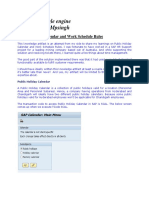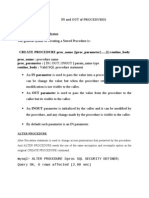Event Classes in Java
Uploaded by
ChidambaramEvent Classes in Java
Uploaded by
ChidambaramEVENT CLASS NAME
INTEGER CONSTANTS
CONSTRUCTORS
METHODS
ActionEvent class
ALT_MASK CTRL_MASK META_MASK SHIFT_MASK ACTION_PERFORMED
ActionEvent(Object src, int type, String cmd, long when, int modifiers) Src -reference Type event type Cmd - command when time modifiers modifierkeys(alt,ctrl,shift,etc) are pressed
getActionCommand() command name getModifiers() modifiers keys pressed getWhen() - time
AdjustmentEvent Class
BLOCK_DECREMENT BLOCK_INCREMENT TRACK UNIT_DECREMENT UNIT_INCREMENT ADJUSTMENT_VALUE_CHANGED
AdjustmentEvent(Adjustable src, int id, int type, int data)
getAdjustable() object that generate the event getAdjustmentType() adjustment type such as decrement, increment, etc
ComponentEvent Class
COMPONENT_HIDDEN COMPONENT_MOVED COMPONENT_RESIZED COMPONENT_SHOWN
ComponentEvent(Component src, int type)
getComponent() component that generated the event
ContainerEvent Class
COMPONENT_ADDED COMPONENT_REMOVED ContainerEvent(Component src, int type, Component comp) Comp component added or removed getContainer() container that caused the event getChild() component added or removed from the container
FocusEvent Class
FOCUS_GAINED FOCUS_LOST
FocusEvent(Component src, int type, Boolean temporaryFlag, Component other) temporaryFlag true if focus event is temporary other other component that lost or gained focus
getOppositeComponent() opposite component is returned isTemporary() true if change is temporary
InputEvent Class
ALT_DOWN_MASK ALT_GRAPH_DOWN_MASK BUTTON1_DOWN_MASK BUTTON2_DOWN_MASK BUTTON3_DOWN_MASK CTRL_DOWN_MASK META_DOWN_MASK SHIFT_DOWN_MASK
isAltDown() to know the key is pressed or not isAltGraphDown() isControlDown() isMetaDown() isShiftDown()
ItemEvent class
DESELECTED SELECTED
ItemEvent(ItemSelectable src, int type, Object entry, int state) entry - item generated event state current state of the item
getItem() reference to the item that generated the event getItemSelectable() -
KeyEvent Class
KEY_PRESSED KEY_RELEASED KEY_TYPED VK_0 to VK_9 virtual key codes VK_A to VK_Z VK_ENTER VK_ESCAPE VK_CANCEL VK_UP VK_DOWN VK_LEFT VK_RIGHT VK_PAGE_DOWN VK_PAGE_UP VK_SHIFT VK_ALT VK_CONTROL MOUSE_CLICKED MOUSE_DRAGGED MOUSE_ENTERED MOUSE_EXITED MOUSE_MOVED MOUSE_PRESSED MOUSE_RELEASED MOUSE_WHEEL WHEEL_BLOCK_SCROLL - Page up or down
KeyEvent(Component src, int type, long when, int modifiers, int code, char ch) code virtual key code (VK_UP) ch character equivalent
getKeyChar() returns character entered getKeyCode() returns key code
MouseEvent class
MouseEvent(Component src, int type, long when, int modifiers, int x, int y, int clicks, Boolean triggers popup) x,y coordinates clicks - no. of mouse clicks triggers popup indicates if the event causes a popup menu MouseWheelEvent(Component src, int type, long when, int modifiers, int x, int y, int clicks, boolean
getX() getXY() getPoint() mouse coordinates getClickCount() isPopupTrigger() getButton() returns the button that caused the event(NO BUTTON, BUTTON1,BUTTON2,BUTTON3) getScrollType() getScrollAmount()
MouseWheelEvent class
WHEEL_UNIT_SCROLL - Line up or down
triggers Popup, int scrollHow, int amount, int count) scrollHow block or unit scroll amount no. of units to scroll count no. of rotational units the wheel moved TextEvent(Object src, int type) - Signal to the listener to retrieve information from a text component
TextEvent class
TEXT_VALUE_CHANGED
WindowEvent class
WINDOW_ACTIVATED WINDOW_CLOSED WINDOW_CLOSING WINDOW_DEACTIVATED WINDOW_GAINED_FOCUS WINDOW_LOST_FOCUS WINDOW_OPENED WINDOW_STATE_CHANGED
WindowEvent(Windows src, int type, Window other, int fromState, int toState) other opposite window when a focus event occurs fromState prior state toState - new state
getWindow() getOppositeWindow() getOldState() getNewState()
SOURCES OF EVENTS
Source Button Checkbox Choice List
Actual event Button pressed Item Selected or deselected Choice changed Item double clicked Item selected or deselected Item selected Checkable menu item is selected or deselected Scroll bar manipulated Character entered Window opened, closed or activated
Event type Action event Item event Item event Action event Item event Action event Item event
Menu Item
Scroll bar Text components Window
Adjustment event Text event Window events
Event Listener Interfaces
The delegation event model has two parts: sources and listeners. Listeners are created by implementing one or more of the interfaces defined by the java.awt.event package.
When an event occurs, the event source invokes the appropriate method defined by the listener and provides an event object as its argument.
INTERFACE
ActionListener
METHODS
actionPerformed( )
GENERAL FORMAT
void actionPerformed(ActionEvent ae)
AdjustmentListener
adjustmentValueChanged( )
void adjustmentValueChanged(AdjustmentEvent ae)
ComponentListener
componentResized()
void componentResized(ComponentEvent ce)
componentMoved()
void componentMoved(ComponentEvent ce)
componentShown()
void componentShown(ComponentEvent ce)
componentHidden()
void componentHidden(ComponentEvent ce)
ContainerListener
componentAdded( )
void componentAdded(ContainerEvent ce)
componentRemoved( )
void componentRemoved(ContainerEvent ce)
FocusListener
focusGained( ) focusLost( )
void focusGained(FocusEvent fe) void focusLost(FocusEvent fe)
ItemListener
itemStateChanged( )
void itemStateChanged(ItemEvent ie)
KeyListener
keyPressed( ) keyReleased( ) keyTyped( )
void keyPressed(KeyEvent ke) void keyReleased(KeyEvent ke) void keyTyped(KeyEvent ke)
MouseListener
mouseClicked( ) mouseEntered( ) mousePressed( ) mouseExited( ) mouseReleased( )
void mouseClicked(MouseEvent me) void mouseEntered(MouseEvent me) void mousePressed(MouseEvent me) void mouseExited(MouseEvent me) void mouseReleased(MouseEvent me)
MouseMotionListener
mouseDragged( ) mouseMoved( )
void mouseDragged(MouseEvent me) void mouseMoved(MouseEvent me)
MouseWheelListener
mouseWheelMoved( )
void mouseWheelMoved(MouseWheelEvent mwe)
TextListener
textChanged( )
void textChanged(TextEvent te)
WindowFocusListener
windowGainedFocus( ) windowLostFocus( )
void windowGainedFocus(WindowEvent we) void windowLostFocus(WindowEvent we)
WindowListener
windowActivated( )
void windowActivated(WindowEvent we)
windowClosed()
void windowClosed(WindowEvent we)
windowClosing()
void windowClosing(WindowEvent we)
windowDeactivated()
void windowDeactivated(WindowEvent we)
windowOpened()
void windowOpened(WindowEvent we)
Using the Delegation Event Model
Follow these two steps: 1. Implement the appropriate interface in the listener so that it will receive the type of event desired.
2. Implement code to register and unregister the listener.
Example for Handling Mouse Events // Demonstrate the mouse event handlers.
import java.awt.*; import java.awt.event.*; import java.applet.*; /* <applet code="MouseEvents" width=300 height=100> </applet> */ public class MouseEvents extends Applet implements MouseListener, MouseMotionListener { String msg = ""; int mouseX = 0, mouseY = 0; // coordinates of mouse public void init() { addMouseListener(this); addMouseMotionListener(this); } // Handle mouse clicked. public void mouseClicked(MouseEvent me) { // save coordinates mouseX = 0; mouseY = 10;
msg = "Mouse clicked."; repaint(); } // Handle mouse entered. public void mouseEntered(MouseEvent me) { // save coordinates mouseX = 0; mouseY = 10; msg = "Mouse entered."; repaint(); } // Handle mouse exited. public void mouseExited(MouseEvent me) { // save coordinates mouseX = 0; mouseY = 10; msg = "Mouse exited."; repaint(); } // Handle button pressed.
public void mousePressed(MouseEvent me) { // save coordinates mouseX = me.getX(); mouseY = me.getY(); msg = "Down"; repaint(); }
// Handle button released. public void mouseReleased(MouseEvent me) { // save coordinates mouseX = me.getX(); mouseY = me.getY(); msg = "Up"; repaint(); } // Handle mouse dragged. public void mouseDragged(MouseEvent me) { // save coordinates mouseX = me.getX();
mouseY = me.getY(); msg = "*"; showStatus("Dragging mouse at " + mouseX + ", " + mouseY); repaint(); } // Handle mouse moved. public void mouseMoved(MouseEvent me) { // show status showStatus("Moving mouse at " + me.getX() + ", " + me.getY()); } // Display msg in applet window at current X,Y location. public void paint(Graphics g) { g.drawString(msg, mouseX, mouseY); } }
Handling Keyboard Events Eg:
/ Demonstrate the key event handlers.
import java.awt.*;
import java.awt.event.*;
import java.applet.*;
/*
<applet code="SimpleKey" width=300 height=100>
</applet>
*/
public class SimpleKey extends Applet
implements KeyListener {
String msg = "";
int X = 10, Y = 20; // output coordinates
public void init() {
addKeyListener(this);
requestFocus(); // request input focus
public void keyPressed(KeyEvent ke) {
showStatus("Key Down");
public void keyReleased(KeyEvent ke) {
showStatus("Key Up");
public void keyTyped(KeyEvent ke) {
msg += ke.getKeyChar();
repaint();
// Display keystrokes.
public void paint(Graphics g) {
g.drawString(msg, X, Y);
Another example: // Demonstrate some virtual key codes.
import java.awt.*;
import java.awt.event.*;
import java.applet.*;
/*
<applet code="KeyEvents" width=300 height=100>
</applet>
*/
public class KeyEvents extends Applet
implements KeyListener {
String msg = "";
int X = 10, Y = 20; // output coordinates
public void init() {
addKeyListener(this);
requestFocus(); // request input focus
public void keyPressed(KeyEvent ke) {
showStatus("Key Down");
int key = ke.getKeyCode();
switch(key) {
case KeyEvent.VK_F1:
msg += "<F1>";
break;
case KeyEvent.VK_F2:
msg += "<F2>";
break;
case KeyEvent.VK_F3:
msg += "<F3>";
THE JAVA LIBRARY
break;
case KeyEvent.VK_PAGE_DOWN:
msg += "<PgDn>";
break;
case KeyEvent.VK_PAGE_UP:
msg += "<PgUp>";
break;
case KeyEvent.VK_LEFT:
msg += "<Left Arrow>";
break;
case KeyEvent.VK_RIGHT:
msg += "<Right Arrow>";
break;
repaint();
public void keyReleased(KeyEvent ke) {
showStatus("Key Up");
public void keyTyped(KeyEvent ke) {
msg += ke.getKeyChar();
repaint();
// Display keystrokes.
public void paint(Graphics g) {
g.drawString(msg, X, Y);
Adapter Classes An adapter class provides an empty implementation of all methods in an event listener interface. Adapter classes are useful when you want to receive and process only some of the events that are handled by a particular event listener interface.
You can define a new class to act as an event listener by extending one of the adapter classes .
And implement only those events in which you are interested.
example // Demonstrate an adapter.
import java.awt.*;
import java.awt.event.*;
import java.applet.*;
/*
<applet code="AdapterDemo" width=300 height=100>
</applet>
*/
public class AdapterDemo extends Applet {
public void init() {
addMouseListener(new MyMouseAdapter(this));
addMouseMotionListener(new MyMouseMotionAdapter(this));
class MyMouseAdapter extends MouseAdapter {
AdapterDemo adapterDemo;
public MyMouseAdapter(AdapterDemo adapterDemo) {
this.adapterDemo = adapterDemo;
// Handle mouse clicked.
public void mouseClicked(MouseEvent me) {
adapterDemo.showStatus("Mouse clicked");
class MyMouseMotionAdapter extends MouseMotionAdapter {
AdapterDemo adapterDemo;
public MyMouseMotionAdapter(AdapterDemo adapterDemo) {
this.adapterDemo = adapterDemo;
// Handle mouse dragged.
public void mouseDragged(MouseEvent me) {
adapterDemo.showStatus("Mouse dragged");
INNER CLASSES: An inner class is a class defined within other class. Inner classes can be used to simplify the code when using event adapter classes . eg. without inner class // This applet does NOT use an inner class.
import java.applet.*;
import java.awt.event.*;
/*
<applet code="MousePressedDemo" width=200 height=100>
</applet>
*/
public class MousePressedDemo extends Applet {
public void init() {
addMouseListener(new MyMouseAdapter(this));
class MyMouseAdapter extends MouseAdapter {
MousePressedDemo mousePressedDemo;
public MyMouseAdapter(MousePressedDemo mousePressedDemo) {
this.mousePressedDemo = mousePressedDemo;
public void mousePressed(MouseEvent me) {
mousePressedDemo.showStatus("Mouse Pressed.");
Eg. With inner class // Inner class demo.
import java.applet.*;
import java.awt.event.*;
/*
<applet code="InnerClassDemo" width=200 height=100>
</applet>
*/
public class InnerClassDemo extends Applet {
public void init() {
addMouseListener(new MyMouseAdapter());
class MyMouseAdapter extends MouseAdapter {
public void mousePressed(MouseEvent me) {
showStatus("Mouse Pressed");
You might also like
- Sap Time Management Holiday and Virriant Configuration Final PDFNo ratings yetSap Time Management Holiday and Virriant Configuration Final PDF47 pages
- Java Events Handling: Delegation Event ModelNo ratings yetJava Events Handling: Delegation Event Model16 pages
- Questions From Previous Papers UNIT-6: Java - Awt.event PackageNo ratings yetQuestions From Previous Papers UNIT-6: Java - Awt.event Package14 pages
- Shri Chhatrapati Shivaji Maharaj College of Engineering Nepti AhmednagarNo ratings yetShri Chhatrapati Shivaji Maharaj College of Engineering Nepti Ahmednagar15 pages
- MODULE-IV Complete Notes Java Events Handling Functions and LayoutManager-1No ratings yetMODULE-IV Complete Notes Java Events Handling Functions and LayoutManager-152 pages
- Basic Programming Using Java Event Handling in AWTNo ratings yetBasic Programming Using Java Event Handling in AWT50 pages
- Modern Programming Tools and Techniques-I: Lovely Professional University, PunjabNo ratings yetModern Programming Tools and Techniques-I: Lovely Professional University, Punjab28 pages
- BSC 2ndsem Java Lecture 11 Event HandlingNo ratings yetBSC 2ndsem Java Lecture 11 Event Handling91 pages
- Advance Java BscIT Sem 5 2015 Paper Solution Mumbai University0% (1)Advance Java BscIT Sem 5 2015 Paper Solution Mumbai University15 pages
- Advanced Java Programming (17625) : Event HandlingNo ratings yetAdvanced Java Programming (17625) : Event Handling40 pages
- Event Handling:: The Delegation Event ModelNo ratings yetEvent Handling:: The Delegation Event Model27 pages
- 3.1 Audio, Video, Speech Synthesis and RecognitionNo ratings yet3.1 Audio, Video, Speech Synthesis and Recognition63 pages
- EX NO: 5 (A) Creation of Simple PL (Procedural Language) /SQL ProgramNo ratings yetEX NO: 5 (A) Creation of Simple PL (Procedural Language) /SQL Program4 pages
- Ex No: 6 Program For If, Nested If and CASE ExpressionNo ratings yetEx No: 6 Program For If, Nested If and CASE Expression6 pages
- Applications of Additive Manufacturing in Coin Industry0% (1)Applications of Additive Manufacturing in Coin Industry13 pages
- Instructional Method Used in Advanced Industrial ArtsNo ratings yetInstructional Method Used in Advanced Industrial Arts11 pages
- K L University Freshman Engineering Department: A Project Based Lab Report On Rank ListNo ratings yetK L University Freshman Engineering Department: A Project Based Lab Report On Rank List16 pages
- Collaborative Knowledge Building: Ethnographic Insights From Geni - Com (May 2011)No ratings yetCollaborative Knowledge Building: Ethnographic Insights From Geni - Com (May 2011)9 pages
- Wheatstone Bridge Circuit and Theory of OperationNo ratings yetWheatstone Bridge Circuit and Theory of Operation10 pages
- 3D Strutural Analysis of Crack Risk in Hardening ConcreteNo ratings yet3D Strutural Analysis of Crack Risk in Hardening Concrete101 pages
- A Study On Effectiveness of Training Programme100% (1)A Study On Effectiveness of Training Programme60 pages
- Neural Information Processing 27th International Conference ICONIP 2020 Bangkok Thailand November 18 22 2020 Proceedings Part V Haiqin Yang 2024 scribd download100% (3)Neural Information Processing 27th International Conference ICONIP 2020 Bangkok Thailand November 18 22 2020 Proceedings Part V Haiqin Yang 2024 scribd download62 pages
- System Proposal For Device Tracking SystemNo ratings yetSystem Proposal For Device Tracking System11 pages
- SWM0066 D400 Software Configuration Guide V320 R7No ratings yetSWM0066 D400 Software Configuration Guide V320 R7271 pages
- COE301 Lab 14 Pipelined CPU Design With Stall CapabilityNo ratings yetCOE301 Lab 14 Pipelined CPU Design With Stall Capability4 pages
- Technical Writer Software Documentation in Atlanta GA Resume Cynthia JonesNo ratings yetTechnical Writer Software Documentation in Atlanta GA Resume Cynthia Jones2 pages
- Everything You Need For Clear and Efficient Data VisualizationNo ratings yetEverything You Need For Clear and Efficient Data Visualization41 pages







































































































